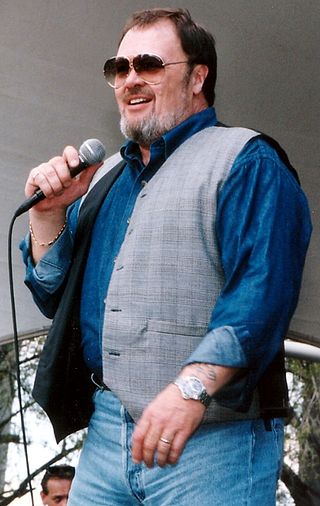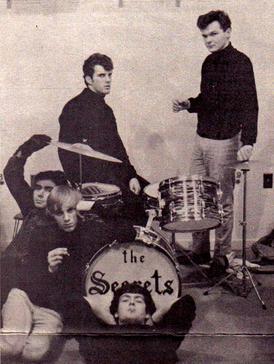Related Research Articles

Buffalo Springfield was a rock band formed in Los Angeles by Canadian musicians Neil Young, Bruce Palmer and Dewey Martin and American musicians Stephen Stills and Richie Furay. The group, widely known for the song "For What It's Worth", released three albums and several singles from 1966 to 1968. Their music combined elements of folk music and country music with British Invasion and psychedelic rock influences. Like contemporary band the Byrds, they were key to the early development of folk rock. The band took their name from a steamroller parked outside their house.

Manfred Mann were an English rock band, formed in London and active between 1962 and 1969. The group were named after their keyboardist Manfred Mann, who later led the successful 1970s group Manfred Mann's Earth Band. The band had two different lead vocalists, Paul Jones from 1962 to 1966 and Mike d'Abo from 1966 to 1969.

The Hollies are a British rock and pop band formed in 1962. One of the leading British groups of the 1960s and into the mid-1970s, they are known for their distinctive three-part vocal harmony style. Allan Clarke and Graham Nash founded the band as a Merseybeat-type group in Manchester, although some of the band members came from towns further north, in east Lancashire. Nash left the group in 1968 to form Crosby, Stills & Nash, though he has reunited with the Hollies on occasion.

The Shadows of Knight were an American rock band from Chicago, Illinois, that played a version of British blues influenced by their native city. When they began recording in 1965, the band's self-description was "the Stones, Animals and the Yardbirds took the Chicago blues and gave it an English interpretation. We've taken the English version of the Blues and re-added a Chicago touch," to which rock critic Richie Unterberger commented: "The Shadows of Knight's self-description was fairly accurate."

David Clayton-Thomas is a Grammy Award-winning Canadian musician, singer, and songwriter, best known as the lead vocalist of the U. S. band Blood, Sweat & Tears. Clayton-Thomas has been inducted into the Canadian Music Hall of Fame and in 2007 his jazz/rock composition "Spinning Wheel" was enshrined in the Canadian Songwriter's Hall of Fame. In 2010, Clayton-Thomas received his star on Canada's Walk of Fame.

Richard Dean Taylor was a Canadian musician, most notable as a singer, songwriter, and record producer for Motown during the 1960s and 1970s. According to Jason Ankeny, Taylor was "one of the most underrated acts ever to record under the Motown aegis."
The CHUM Chart was a hit parade that consisted of 50 top tunes from May 1957 to July 1968, but in August 1968, the top 50 song list was reduced to 30 top songs until the final hit parade was issued in June 1986. Furthermore, CHUM was a Toronto, Ontario radio station of which the call letters were CHUM AM, from 1957 to 1986, and was the longest-running Top 40 chart in the world produced by an individual radio station. On January 10, 1998, sister station CHUM-FM, which airs a hot adult contemporary format, revived the CHUM Chart name for a new countdown show.

"I Put a Spell on You" is a 1956 song written and composed by Jalacy "Screamin' Jay" Hawkins, whose own recording of it was selected as one of the Rock and Roll Hall of Fame's 500 Songs that Shaped Rock and Roll. It was also included in Robert Christgau's "Basic Record Library" of 1950s and 1960s recordings—published in Christgau's Record Guide: Rock Albums of the Seventies (1981)—and ranked No. 313 on Rolling Stone magazine's list of The 500 Greatest Songs of All Time. The selection became a classic cult song covered by a variety of artists and was his greatest commercial success, reportedly surpassing a million copies in sales, even though it failed to make the Billboard pop or R&B charts.

"Get Together", also known as "Let's Get Together" and "Everybody Get Together", is a song by American rock band the Youngbloods, originally included in their 1967 debut album The Youngbloods. It was written in the mid-1960s by American singer-songwriter Chet Powers, from psychedelic rock band Quicksilver Messenger Service. The single was The Youngbloods' only Top 40 on Billboard Hot 100—peaking at No. 5 in 1969.
The Artwoods were a British rhythm and blues band who formed in 1963 and were professionally active between 1964 and 1967. They were a popular live attraction, rivalling groups such as the Animals, although, despite releasing a clutch of singles and an album, their record sales never reflected this popularity.
The Sparrows was a Canadian blues rock band of the 1960s. Notable for being the first group to bring musician John Kay into the mainstream, the Sparrows later morphed into the popular heavy rock group Steppenwolf.
Douglas Brian Riley, CM was a Canadian musician, also known as Dr. Music. He spent two decades with the Famous People Players as its musical director, besides his participation on over 300 album projects in various genres. Riley died of a heart attack on August 27, 2007.
The Tripp, known earlier as The Just Us and later Livingston's Journey, was a Canadian rock band, based in Toronto from the mid-1960s, featuring Neil Merryweather and Stan Endersby.

The Robbs were an American 1960s pop and rock band from Oconomowoc, Wisconsin. They are best known for being the house band on Dick Clark's mid-1960s show Where The Action Is. They are also known for placing the most singles on Billboard magazine's "Bubbling Under" chart without ever once crossing over into the Billboard Hot 100.
"You Were on My Mind" is a popular song written by Sylvia Fricker in 1961. It was originally recorded by Ian & Sylvia, but better known versions were recorded by We Five and Crispian St. Peters.

The Dave Clark Five were an English pop rock band which formed part of the British Invasion of beat music groups in the early-mid 1960s.
Jackie Shane was an American soul and rhythm and blues singer, who was most prominent in the local music scene of Toronto, Ontario, Canada, in the 1960s. Considered to be a pioneer transgender performer, she was a contributor to the Toronto Sound and is best known for the single "Any Other Way", which was a regional Top 10 hit in Toronto in 1962 and a modest national chart hit across Canada in 1967.

The Quiet Jungle was a Canadian garage rock band formed in Toronto, Ontario, in 1965. At the beginning of the group's recording career, they achieved success with pop and novelty songs. In addition, the band recorded cover albums for Arc Records before venturing into early elements of psychedelic rock with their best-known single "Ship of Dreams" in 1967. The Quiet Jungle released one more single later in the year before disbanding; however, more recordings are rumored to exist.

Robbie Lane and the Disciples is a Canadian rock band, that peaked in the 1960s. A cover of Neil Sedaka's "What Am I Gonna Do" was their biggest success, reaching #10 in 1966. They also recorded an early version of the hit song "Soul Deep" in 1966.
The Regents were a Canadian group formed in 1959. They started out as a club band and then reformed as a recording band. They had a Top 20 hit with "Me and You".
References
- ↑ Ritchie Yorke, Axes, Chops & Hot Licks: The Canadian Rock Music Scene. M. G. Hurtig, 1971. ISBN 9780888300522.
- ↑ "Tales from the Matador: If you can't remember where you've been, but you remember having a good time..." Toronto Star , June 16, 1994.
- ↑ "CHART NUMBER 328 – Monday, June 24, 1963". Archived from the original on July 15, 2006. Retrieved 2016-01-21.
{{cite web}}: CS1 maint: bot: original URL status unknown (link). CHUM Chart. - ↑ "CHUM HIT PARADE: Week of July 1, 1963". Archived from the original on November 7, 2006. Retrieved 2016-01-21.
{{cite web}}: CS1 maint: bot: original URL status unknown (link). CHUM Chart. - 1 2 3 4 "Oh Charlena: 50 years and still going strong". Whitby This Week , July 15, 2013.
- ↑ "Bluesman made his mark". The Globe and Mail , June 16, 2003.
- ↑ Billboard, August 9, 1969 - Page 96 From The Music Capitals of the World
- ↑ "CHUM Hit Parade - June 24, 1963".
- ↑ "RPM Play Sheet - November 15, 1965" (PDF).
- ↑ "RPM Top 100 Singles - July 11, 1966" (PDF).